#asteria worshipper
Explore tagged Tumblr posts
Text
Not a Hypnos devotee, but as an Asteria and Morpheus devotee I would have friends sleep on my bed because they said it was the nicest bed to nap/sleep in.
This was in my uni dorm back in the day. I had the same exact single bed as everyone else. 🙈
I also had all pets, past and present, fall asleep on me without much trouble and would actually seek out my lap to sleep on. 💜
Hypnos's energy goes through His devotees.
When your friend sleeps upon your shoulder, that is Hypnos alongside you.
When your partner dreams of you, that is Hypnos with you.
When you wake up to your beloved pet laying on you or near you, that is Hypnos with you.
Hypnos is sleep, Hypnos is dreams
He is personification of concepts, divinity of these things, he is
You face Hypnos in the eyes when you close them with rest on your mind
#asteria worship#asteria deity#asteria goddess#asteria worshipper#lady asteria#asteria#morpheus#morpheus worship#morpheus deity#morpheus god of dreams#morpheus worshipper#lord morpheus#dream witchcraft#dream witch#dream work#dream worker#hellenic pagan#hellenic polytheism#hellenic deities#deity worship#pagan#helpol#hellenic#hellenism
580 notes
·
View notes
Text


☀️ Start of the day prayer to Hekate
Hail to Hekate, Keybearer of the Realms, Protector who Averts Evil, Powerful Teacher and Guardian.
Hear me, daughter of Asteria and Perses, who steps in bronze sandals and carries a saffron veil.
I honour you and come before you in truth and reverence to ask for your blessings and protection as I navigate this day.
May you be with me at each crossroad and avert evil from me, your humble worshipper. Hail Hekate!
🌙 End of the day prayer to Hekate
Hail to Hekate, Goddess of the Sky, Sea and Underworld, Queen of the Crossroads, Guide of Souls.
Hear me, Night-Wandering Goddess, she who holds her torches high and bright, trailed by the nymphs of the underworld, bearing light.
I honour you and come before you in truth and reverence as my day comes to an end.
May you illuminate all that needs to be known in my dreams and protect me through the night as your humble worshipper. Hail Hekate!

divider credit -> @enchanthings-a
#✶ — › prayers and hymns#hellenic polytheism#hekate#hekate devotee#hekate worship#hekate goddess#hellenic worship#hellenic deities#paganism#hellenic pagan#helpol#hekate deity
90 notes
·
View notes
Text

Hekate Propylaia
"She who is before the gate"
"I call upon Hekate Propylaia, the Guardian, She who protects the gate, the unyielding Goddess who ends all hostility, to protect me and mine, to guard and keep us safe. Powerful Goddess, Gatekeeper, Foremost One, hear my plea and prayer, stand before me, hold all evil at bay with your relentless fire." - Prayer to Hekate Propylaia (modern-day)
I've found myself getting more and more into my Hekate worship, and I'm very happy about it. I had once fallen into the trap that Hekate was "scary" or "too advanced", something I think many worshippers have gotten into their heads. From the small time I have been worhsipping Her, I can certainly say this is not the case; She is wonderful.
Liminality. Something heavily associated with Hekate, and one of the many aspects I find quite interesting and comforting about Her. The grey area was always more comfortable. Hekate Propylaia, I think is an epithet that embodies that liminality - of course Lady Hekate has many epithets that embody this, but Propylaia feels right to me. It feels like standing at a gate and not knowing what's on the other side, but not willing to turn back - it feels like the entrance and exit - like the beginning and end - like the true middle ground. A liminal space, with Hekate at the centre.
Liminality is so present in every part of our lives, the "in-between stages" are everywhere. And honestly, are we ever not in an in-between phase? From day to night. From waking to resting. Child to adult. We are always meeting these milestones, these gates to pass through, and as we learn more and do more - Hekate is there.
A small portion, but one I want to still touch on is liminality in a gender sense. Hekate has many forms, and many names, and there is never one point where Hekate is just one. She is many, and She is blurred, and She has many off-shoots and directions to percieve Her in just like a crossroads. Hekate represents the "not-straight-forward" and I think that's a wonderful thing.
Anyway, that ramble over, I just wanted to let you all know the little Hekate worship rabbit hole I've been down as of late. I may have repeated things so please excuse that, it's late at the time of writing.





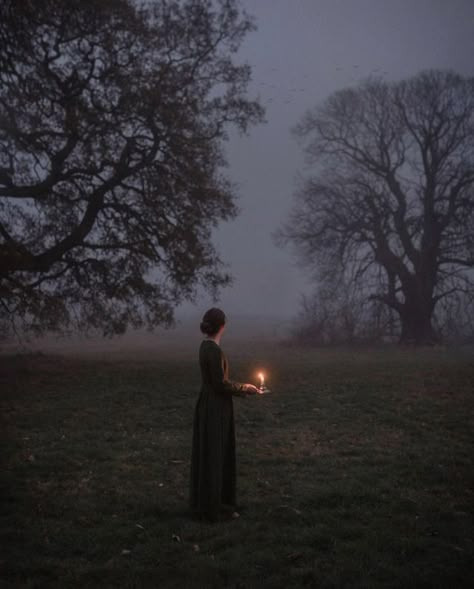



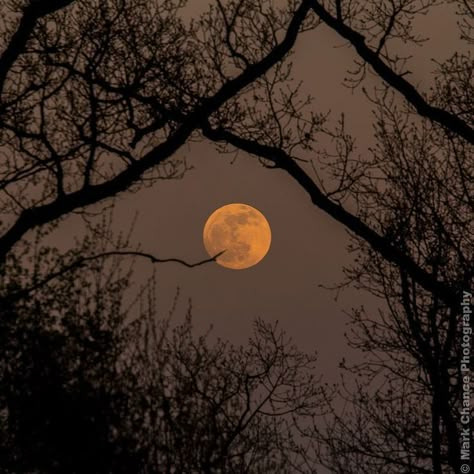

A poem for Hekate Propylaia - by me
I walk this earthly plane And lay awake at night, watching Asteria shine, To hear the hounds of Hekate sing Of Her glorious domain; as She watches From the gate which She tends, Ushering in the frightened and the lonely Into Her wonderful home of Liminality.

I hope everyone is having a lovely Spring / Autumn Equinox [depending on your hemisphere]! And may Hekate Propolos guide you, Hekate Dadophoros light your way, and Hekate Propylaia show you the right doors in these uncertain times.
Hail Lady Hekate!

Brown header + footer: @/the-aethetics-shop Brown heart dividers: @/adornedwithlight
#song to the theoi#wordless diary#hekate#lady hekate#hecate#hekate deity#hecate deity#hecate worship#helpol#hellenic polytheism#hellenic deities#eoffering#e offering#digital offering#devotional poem#devotional art#moodboard offering#moodboard#hekate propylaia#propylaia#hekate epithet
72 notes
·
View notes
Text
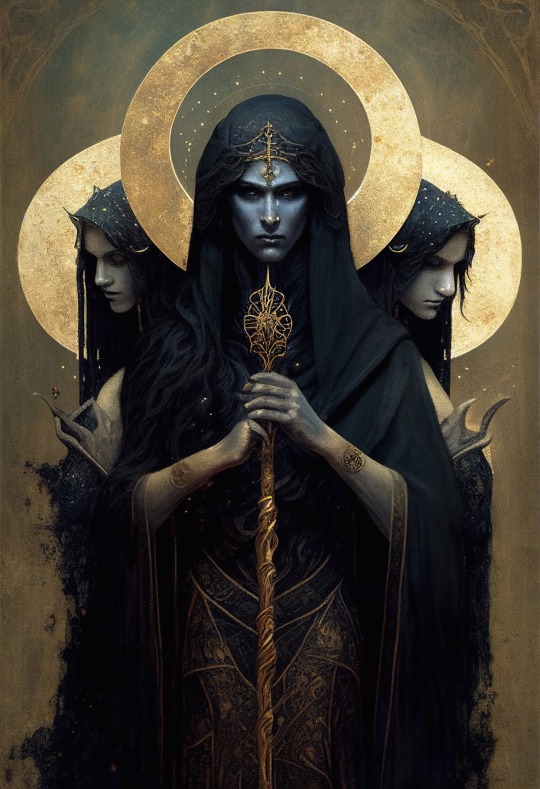
Hecate: Triple-Bodied Greek Goddess of Witchcraft and Keeper of Keys
Hecate the goddess of Greek mythology has been primarily remembered for her associations with magic and witchcraft. Throughout history however, her sphere of influence also included the moon, night, crossroads, boundaries, ghosts and necromancy. Although Hecate was once considered to be a powerful Greek goddess of witchcraft, Hecate was not a major deity when compared, for instance, to the Twelve Olympians.
There are therefore few myths which revolve around this Greek goddess of magic. Nevertheless, the goddess Hecate plays a particularly important role in the Greek myth which relates the abduction of Persephone. It is also from this myth that the quintessential representation of Hecate, as a goddess holding a flaming torch in each hand, is derived.
The Powers of Hecate, the Greek Goddess of Witchcraft
It is generally believed that the goddess Hecate was the daughter of Perses and Asteria, both of whom were from the second generation of Titans. Nevertheless, some have claimed that she was the daughter of Zeus and either Hera or Pheraea. Yet others have stated that she was a daughter either of Leto or of Tartarus.
In any case, it is widely accepted that Hecate the goddess was not originally a member of the Greek pantheon. In fact, her cult is said to have originated in ancient Thrace, or perhaps in Caria, Anatolia. The original worshippers of Hecate believed that the goddess had power over heaven, earth, and the seas, thus making her an incredibly powerful goddess.
Hecate, whose name came from the Greek word hekatos meaning “worker from afar,” had the power not only to bestow upon those she favored wealth, good fortune, and wisdom, but also to withhold these gifts from those she perceived as unworthy. She was honored by all the gods, including Zeus. As she sided with the Olympians during the Titanomachy, she was the only member of the old regime who retained her powers following the defeat of the Titans.
Within ancient Greek religion Hecate had many different roles, as goddess not just of witchcraft, but also of magic, spells, the night, ghosts, light, necromancy, and even the moon. She was also seen as a goddess of oikos, meaning the household and family, and doorways. Some have even connected her to Artemis, who was portrayed in a similar style, with boots, torches and dogs.
Due to her extensive powers, Hecate has been confused and identified with several other deities throughout history. For instance, as a goddess of nature, she was identified with Demeter, whilst as a moon goddess, she has been identified with Persephone.
Hekate, Keeper of the Keys Talon Abraxas
56 notes
·
View notes
Text
Hekate
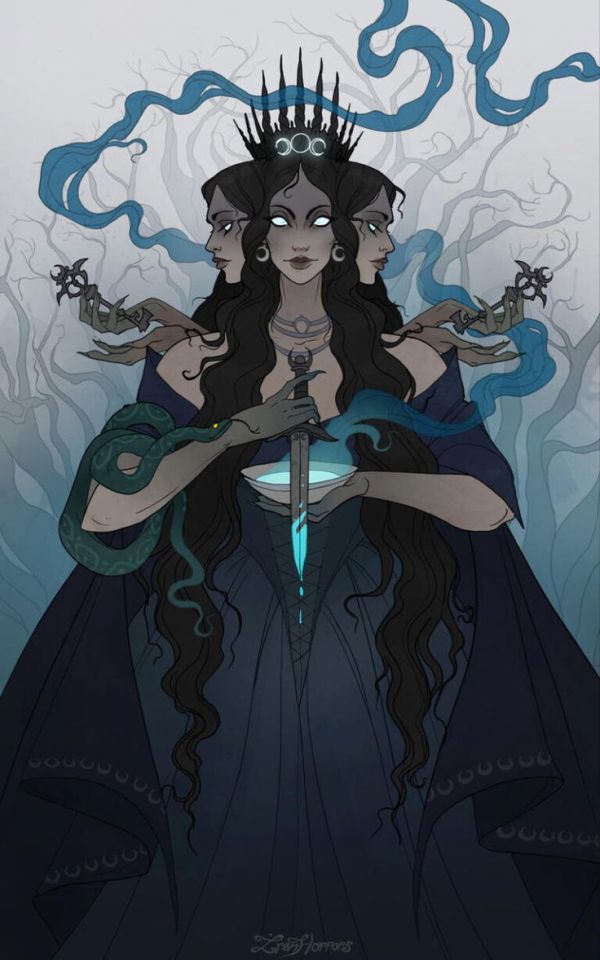
One of the lesser-known deities in the Greek pantheon is Hecate. Being the only Titan to maintain her authority under Zeus' rule, she was the child of Perses and Asteria. The limits of the heavens, the earth, the oceans, and the underworld were not able to contain Hecate's might.
The stories surrounding the goddess Hecate tell us a lot about her domains of influence even if there aren't many myths about her. Many of her characteristics were associated with the underworld in the time of the Romans. But she also had power over things that positioned her squarely in the spotlight. The goddess held great abilities that other gods eventually adopted. Hecate could provide money and benefits to those who worshipped her, but she could also withhold these gifts from those who did not honour her sufficiently. This essay will examine the characteristics and emblems of Hecate.
The origins of Hekate:
Classicalists disagree over where the worshippers of Hecate came from in ancient Greece. There are many who trace the origins of goddess worship back to pre-Greek times, while others trace it back to Thrace. The most widely recognised theory is that Hecate came from the Carians in Asia Minor and was incorporated into Greek religion. Scholars say that the deity is said to have arrived in Greece in the Archaic period. The quantity of cult sites devoted to the goddess Hecatean attests to the adoration of the goddess in Caria. These were particularly noticeable in Lagina. Nonetheless, other classicists contend that the goddess cannot have an Anatolian origin because of the late dates of these Anatolian worship sites.
According to historical accounts, Hecate initially appears in the seventh century BCE in Hesiod's Theogony. Hesiod just makes reference to her parents and her part in the Gigantomachy, in which she slew Clytius. She is noticeably missing from the Homeric epics, though. The most famous literary appearance of Hecate is perhaps her portrayal in the Homeric Hymn to Demeter. Hecate and the sun god Hyperion hear Persephone's screams as Hades kidnaps her in the song. Hecate appeared to Demeter on the tenth day, holding a lamp, after she had been looking for her daughter for nine days.
The goddess did not know who had abducted her daughter, but she informed Demeter what she had heard. Hecate gave Persephone a hug once she was reunited with Demeter. When Persephone went back to Hades every year, she would become her underworld companion. One common iconography associated with this narrative is Hecate holding a torch.
Her divine duties:
In Greek religion, Hecate was entrusted with a wide range of heavenly responsibilities. She was most famously the goddess of the moon, sorcery, witchcraft, darkness, light, and ghosts. She was also the goddess who guarded entranceways and oikos.
As a triple goddess, Hecate was closely connected to the intersection. She was described as a liminal deity with effortless passage from the underworld to the outside world. Her ability to transition between her roles as a goddess and a Titan came from her mythology and lineage. Her cult names and epithets, such as Propylaia (of the gates), Trodia (frequenter of the crossroads), and Enodia (on the path), witness to her liminality.
Lucan's Pharsalia had solidified Hecate's status as a goddess of witchcraft and sorcery by the first century CE. In the Pharsalia, the witch Erichtho calls upon Persephone, the lowest manifestation of Hecate. We discover the hag-like characteristics bestowed to Hecate in the Pharsalia.
Ghosts and Lampades, or nymphs of the underworld, were part of her entourage. Legend has it that Zeus gave Helen the Lampades as a present for her allegiance to him during the Titanomachy. The goddess goes at night with the Lampades, who bear lamps. Depictions of the goddess:
Greek ceramics frequently featured Hecate as a single figure, dressed in a long gown, clutching torches. At intersections and gateways stood the pillars of Hecataea, the goddess of torch-bearing. Later, the most common iconography of Hecate shows her as a triple-formed goddess, each form standing behind the other and facing a different way at a crossroads.
She added the Graces dancing around the goddess, like in the top image, to some of her sculpture votive offerings. She is accompanied by a pack of dogs in some depictions. Pausanias claims in his Description of Greece that Alcamenes, a sculptor, was the first to show Hecate in her triple-form about the fifth century BCE. He adds that next to Wingless Victory's temple on the Acropolis in Athens was a sculpture of the goddess Hecate Epipurgidia (on the tower).
Hecate is shown as trimorphic on the well-known Pergamon Altar (c. 2nd century BCE), battling a monster that resembles a snake with the aid of a dog. Hecate's triple form was shown as three distinct bodies around a central column throughout antiquity. However, this depiction changed into a single goddess with three heads in late antiquity. Hecate is described as having three heads in esoteric literature from this era: the heads of a dog, a serpent, and a horse. Hecate was also associated with other deities from neighbouring pantheons.
Connectivity With Artemis:
Hecate, also known as Ἑκατη, is derived from the Greek term hekatos, which means "worker from afar." One of the most prevalent epithets for Apollo is the male version, Hekatos. This Apolline epithet, according to researchers, associates Hecate with Artemis, a goddess with comparable realms of power. The goddesses had many of the same characteristics. In most depictions, both goddesses were seen with dogs, holding torches, and dressed in hunting boots. Frequently, they were combined to create a twin goddess, as seen in Aeschylus' Suppliants. The chorus in Aeschylus' play refers to the two goddesses as one. The goddesses are once again consolidated in Aristophanes' Frogs (1358f), when the goddesses are called upon by the figure of Aeschylus. Connectivity with Artemis-Selene:
Hecate was combined with the goddesses Artemis and Selene throughout the Roman era, especially in Roman poetry. She was referred to by her Roman name, Trivia, in addition to her combined triple form. By referring to Hecate as Hecate-Selene and other such monikers, the Roman authors fostered her trimorphic representations. Seneca makes many references to Hecate along with her lunar equivalents, even drawing a connection between the goddess and Medea.
Connectivity with Iphigenia
Hecate was identified by early ancient accounts as the daughter of Agamemnon, Iphigenia. Pausanias quotes Hesiod as saying that Artemis's will transformed Iphigenia into Hecate, not killing her. Hecate was sometimes identified in this way with a deity known to the Tauri as Iphigenia. Connectivity with Hermes:
Hecate was identified as the wife of this chthonic Hermes in many ancient traditions. Hermes also had chthonic features. Being gods of the dead, Hecate and Hermes were able to cross borders and liminal zones between realms. First appearing in the first century BCE, the Roman poet Propertius proposed a link between these two gods.
Hekate's sacred animals:
The dog was Hecate's most holy animal, as was previously indicated. The sound of dogs barking from the underworld is described by Apollonius of Rhodes as accompanying Hecate. Pausanias and Ovid, two ancient writers, mention that dogs, especially black canines, were offered as sacrifices to the goddess. Additionally, scholars have proposed that Hecate's connection to dogs is indicative of her function as a goddess of birth. This is so because other birth goddesses, such Eileithyia and Genetyllis, also revered dogs as their holy animals. Hecate's hounds were later connected to the restless spirits of the deceased that followed the goddess in antiquity. Queen Hecuba's transformation into a dog is associated with the goddess Hecate. After Troy fell, so the tradition goes, Odysseus took Hecuba as a hostage. But while travelling to Greece, the Trojan queen slew a Thracian king. Hecuba was punished by being changed into a black dog, which she later adopted as a pet.
The polecat, or weasel, was another animal considered sacred by the goddess Hecate. In the mythology recounted by Antonius Liberalis, Galinthias, Alcmena's midwife, tricked the gods when Heracles was born. Galinthias went to the goddess of childbirth, Eileithyia, after observing Alcmena experiencing labour pains. The Fates informed them that the child had been delivered and had prolonged the labour as a favour for Hera. Galinthias became a polecat in punishment for tricking the gods. Galinthias was chosen by Hecate, who felt sorry for her change, to be her friend and attendant.
Honouring the Goddess Hecate:
In mainland Greece, the worship of other Olympians was more common than the cult of the goddess. In the ancient world, the goddess had a small number of temples devoted to her. In the past, smaller home shrines dedicated to Hecate were typical. These little shrines were built to fend off evil and shield the person from sorcery. The three most important Hecate worship sites in Greece were on the island of Samothrace, in Caria, and in Eleusis.
The goddess was revered as a deity of the mysteries in Samothrace. Her worship has also been documented at Athens, Colophon, Thrace, and Thessaly. Dog sacrifices made in the goddess' honour have been documented in the last two cities. According to Pausanias, Hecate was the goddess most revered by the Aegina people, who thought Orpheus had instituted the goddess's ceremonies on the island. Pausanias also mentions a wooden representation of Hecate that is housed in the temple of Aeginetan.
Hecate has many Orphic Hymns, but no Homeric Hymn dedicated to her. Actually, a song honouring the goddess starts the collection of Orphic Hymns. Her significance stems from her function as a goddess of entrances. Many details concerning Hecate's realms of influence as understood by the Orphics may be found in the Orphic Hymn to Hecate. She was invoked as the goddess of highways and crossroads in their mysteries.
Most notably, she is also called the goddess of the dead, who presides over deserted places. In this hymn, her sacred animals include deer, dogs, and wild predators. She is described as the herder of bulls and a nurturer of youths, as well. The hymn beseeches the goddess to come to the holy rites in a favorable mood with a happy heart.
The more we discover about the goddess Hecate, the more fascinating she appears to be. Her role as a guardian is highlighted by her roles as a liminal figure and a goddess of pathways and entrances. However, her evil side is revealed by her function as a nighttime goddess of sorcery and witchcraft. Hecate is a complex character who merits consideration on par with the more well-known Greek pantheon gods.
Zeus granted Hekate jurisdiction over land, sky, and water (underworld). This was either given to her to aid the Olympians in their fight against the titans (her own "people") or after the event was completed. It wasn't "her power can't be contained"; she was shown to be worthy of the realms.
She was always a deity of witchcrafts and necromancy in ancient Turkey, but when the Romans came in, they kind of wiped off her necromancy features.

Offerings to give to her:
Edibles-
Breads - i personally give her garlic bread
Cakes
Pomegranates
Wines
Honey
Cinnamon
Garlic
Onion
Milk
Chocolates
Non edibles-
Roses
Lavender
Poppy seeds
Dandelions
Blood: If you have ever battled with self-harm of any type or are easily nauseated at the sight of blood, DO NOT ATTEMPT. She cherishes your mental health and well-being more than anything you could ever offer it to her, and Hekate understands that you cannot give Her your essence! She is going to adore and defend you no matter what!
Incense she likes-
Frankincense
Lavender
Jasmine
Citrus - especially orange
Dragons Blood
Other-
keys *
Candles
Tea Lights
Bones
Fires - i.e. bonfires *
Oil lamps
Lavender *
Crow/Raven/Owl Feathers - only feathers naturally fallen off
Statues of Her and Her sacred animals *
Poetry, literature, and music you heavily associate with Her **
Witchraft books, spell books, dedicate any shadow work to her
Devote things to her-
Give food, clothing, toiletries, and other necessities to homeless shelters.
Visit cemeteries and, if permitted (please inquire beforehand), place flowers on the graves
Possess a plush toad, dog, or polecat.
Devote a meal or self care to her!
Give to the less fortunate. If you see a homeless person, get them a hot meal and a hot drink ect. Say a prayer to her before you do it
Share some tea with her or have a cup with her
Adding onto the sharing tea, sit at her altar with the tea and some cake. Talk to her, tell her about your day or ask her about hers
Do some baking and share what you baked
#pagan witch#witch#witchblr#witchcore#witchcraft#beginner witch friendly#hekate#hellenic#deity work#deity worship#hekatean witch
56 notes
·
View notes
Text
𝕳𝖊𝖐𝖆𝖙𝖊
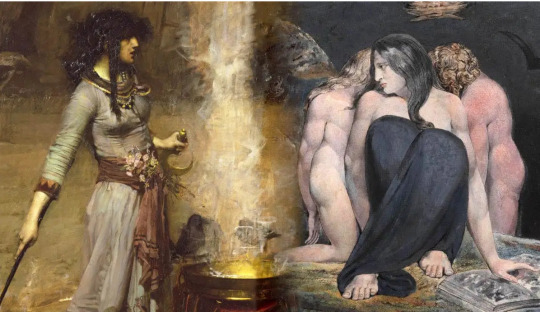
Hecate, a multifaceted Greek goddess, is associated with magic, witchcraft, the moon, and the night, and is often depicted as a triple-formed deity symbolizing the Maiden, Mother, and Crone. 
Child of Perses and Asteria, she was the only Titan to retain her control under Zeus’ reign. Hecate’s powers transcended the boundaries of the sky, the earth, the seas, and the underworld. Although there are few myths about the goddess Hecate, her tales reveal a lot about her spheres of influence.
During the Roman era, many of her attributes fell in the realm of the underworld. Yet, she also controlled elements that placed her firmly in the light. The goddess possessed extensive powers, which were later assimilated by other deities. Hecate could bestow wealth and blessings on her worshippers, yet she could also withhold these gifts if she were not adequately worshipped.
Hecate’s scope of divine duties was extensive in Ancient Greek religion. She was most notably the goddess of magic, witchcraft, the night, light, ghosts, necromancy, and the moon. Further, she was the goddess and protector of the oikos, and entranceways.
In her form as a triple-goddess, Hecate was strongly associated with the crossroads. She was portrayed as a liminal goddess who can cross from the underworld to the physical world with ease. Her liminality stemmed from her parentage and mythology, where she was able to move between her position as a Titan and a goddess. This liminality is attested to by her epithets and cult titles such as: Enodia (on the way), Trodia (frequenter of the crossroads) and Propylaia (of the gates).
Hekate is essentially a liminal figure. She is a crosser of boundaries and is repeatedly associated with “between” states. Hekate crossed the Titan and Olympian regimes, the realms between the mortal and divine, and the living and the dead. Her liminality is seen in her iconography, many epithets, and places of worship such as borders, crossroads, city walls, and doorways.
Hekate has few myths. The Homeric Hymn to Demeter is perhaps her most well-known literary appearance. In the hymn, Hekate and the sun god Helios heard Persephone’s cries when Hades abducted her. When Hades returned Persephone to her mother Demeter, Hekate embraced her and became Persephone’s attendant. Carrying her twin torches, Hekate guides Persephone in her journey to and from the Underworld. Hekate was an important goddess of the Eleusinian Mysteries. Hekate is said to hold the keys to the gates of the Underworld.
We see Hekate’s association with witchcraft in the famous stories of the enchantresses Circe, who is sometimes said to be Hekate’s daughter, and Medea, who is Circe’s niece and identifies herself as Hekate’s priestess. Both of them demonstrate significant knowledge of herbal and poison magic.
Hekate is repeatedly associated with herbal and poison magic. In Ovid’s telling of the story of Arachne, the goddess Minerva uses “extract of herbs of Hecate” to transform Arachne into a spider.
Plato wrote, “Thessalian women were very skilful in sorcery and poisoning. They stood in close relation to the night-goddess Hekate; hence people ascribed to them the power to draw the moon from the heavens.”
Given Hekate’s chthonic power and her role as a leader of the restless dead, her magic includes necromancy. Attitudes about witchcraft and necromancy were conflicting, but the ancient Greeks and Romans sought knowledge from the dead and called on them for assistance. They slept on tombs, wore the deceased’s clothes, addressed curse tablets to ghosts, created effigies, and attempted to reanimate corpses.
Accounts of necromancy in Greek myths appear in the stories of Circe and Medea, in the witchcraft of Horace’s anti-muse Canidia, those of the Thessalian witch, Erichto, and others. The association of Hekate with witchcraft and necromancy continued for centuries and remains with us today.
Hekate. Her name awakens the soul of a witch. This unfoldment occurs as we learn to listen to the voice of the goddess. Hekate is a complex goddess with a long history. She is the Goddess of Witchcraft, a guide along the path, and the universal Keeper of the Keys. There is much to learn about Hekate from the written records, but for a witch to truly know Hekate, we need to experience her. This is our awakening to what has always been within us. She is Psychopomp, The Guide who leads us back to our soul. And she is a face of The Great Mother, creatrix and destroyer of all.
Unlike other goddesses, Hecate is a goddess that dwells on the very edges of reality. She might be dubbed the goddess of witchcraft, but she holds dominion over the more critical aspects of life. One that questions the morality of evil.
The three bodies of Hecate all sum up the surreal form that gives the goddess of magic her charm. She acts as the veil between bad and good, enchantment and sorcery, evil and lawful.
#spirituality#divination#witchblr#tarot#witch#witchcraft#free tarot readings#witch community#astrology#pagan#hekate#goddess#goddess hekate#goddesses#deity#deity work#deity worship#witch blog#pagan witch#witchy vibes#witchcore#witchy#witches#witch aesthetic#eclectic witch#witch stuff#Spotify
30 notes
·
View notes
Note
The inconsistencies within myth can usually be explained by examining from what time and region it came from.
In the Theogony, Leto among others such as Demeter, Themis, Mnemosyne are brides of Zeus before he chose his final wife Hera.
The Apollo myth did not exist or was not known by the author of Theogony when he wrote it.
In early literature Leto was simply a consort of Zeus who birthed Apollo and Artemis (who weren't even stated to be twins at the time) with no complications or grand story about their births. Letos etymology even gets used in some epithets or cult uses for Hera.
It seemed like that myth came way later in the development of Apollo most likely being a myth to explain the significance of his cult in Delos (like making the islamd his literal aunt). Contrary to popular belief, Leto was not chased down by Hera because she was a mistress, it was because she wanted to prevent the birth of Apollo who was prophesied to be more loved by Zeus than Ares.
Leto's affair was not treated as something scandalous by the ancient Greeks compared to Semele because it really was a whole lot of nothing in the grand scheme of things. She was highly respected in cult as the most gentle goddess on Olympus and a celebrated mother alongside Demeter, as she was seen as a legitimate consort of Zeus and had a throne besides him similar to Hera. She served a role more akin to a pallake (recognized mistress), if anything rather than some shameless homewrecker.
People usually leave out a lot of historical context.
I'm losing my point lol, Hera's wrath towards Leto most likely came way after the creation of the Theogony whete Leto was imply a consort of Zeus who didn't suffer any birthing trauma
Good point about the inconsistencies, and let's also not forget the stories and the myths were often exchanged and re-told from mouth to mouth. Including the Iliad. Bits and pieces of what happened and the events on the battlefields were spread by oral historians and storytellers, so naturally things got paraphrased a lot before Homer wrote it down.
About Hera and Leto- I think that's just the most widespread myth and the one I personally remember being introduced to as a kid. But there are records of Leto/Latona being very respected and beloved by her worshippers. Her family history is a bit obscure, what with her sister Asteria being pursued by Zeus and turning into the island Delos, but there aren't any myths about her committing atrocious deeds like the other Olympians. The most questionable one I can recall was Apollo and Artemis slaughtering Queen Niobe's children in the name of Leto's honour at her request.
I can't imagine Hera is fond of Leto for multiple reasons (and vice versa obviously) but I don't really think they interact much. Same with Maia, Hermes' mother. I guess Leto and Maia sort of stay out of the way and let life on Olympus go on as it pleases, because they know they aren't rated above Hera in Zeus' head and he won't protect them should things go awry.
Thank you for the ask!
9 notes
·
View notes
Text
HEKATE MASTER POST

(This is one big info post on Hekate, all sources are linked (hekates name) as well as upg post. I will mark which one is which dw. More will be added to the upg and info list and if you have any other suggestions on what I can put there feel free to dm me)
I started to worship Hekate immediately once I moved out of my mother house. I wasn't really allowed to practice at her house so with me finally being free I wanted to get all into it, Hekate showed me where to go. I've been under hekates wing for about a year now and I've learned so much from her and she's opened so many doors! I really hope this post does the same for future Hekate worshippers!!
WHO IS HEKATE?
Hekate is a goddess of Greek mythology. She is the goddess of witchcraft, necromancy, liminal spaces, doorways, crossroads, good and evil. She is associated with the moon, liminal spaces, crossroads, keys, doorways, creatures of the night, dogs, bloodhounds, the night, darkness.
She is the daughter of Perses and Asteria, making her the granddaughter of the Titans Phoebe and Coeus. Euripides, on the other hand, mentions her mother is Leto. Other writers claim her as the daughter of Zeus and Demeter, Aristaion or Night. The goddess was frequently associated with Demeter and even assimilated to her in some cults. It is known that Zeus favored Hekate and gifted her land, sea, and sky, making her the goddess of boundaries.
HEKATES ROLE
Hekate became a household and protective goddess in the 5th century BC. She had cults closely tied to Persephone and Demeter. Rituals done for specificly her were the supper of Hekate: offerings given at crossroads as a sort of libation. The offerer would give offerings of illuminated cakes, meat, sacrifices of puppies, garlic, eggs, water, and frankincense. After the offering was given the offerer will walk away from the crossroads and not look back, as it was said if you looked back spirits would follow you home.
As a house hold goddess, she was given shrines or altars in doorways, it was said that this kept unwanted guest and spirits away. She was also given altars near the hearth of the home as protection.
UPG
Hekate shows herself as a tall hooded figure with chains around her body. She takes her work very seriously and expects her followers to as well.
Some workings that she's helped me with are:
- road opener spells
- spell workings in general
- baneful wards
- lunar magic
Some offerings that I like to give:
- black things (nail polish, necklaces)
- eggs
- wine
- olive oil
- frankincense
- water
UPG/INFO POSTS
- Hekate fact list (info post)
- subtle offerings to Hekate (UPG post)
-hekate reading list (info post)
- Hekate info post (info post)
- grounding with Hekate (UPG post??)
35 notes
·
View notes
Note
hey! i stumbled upon your blog looking at the hellenism tag :]
i’ve always felt a connection to hellenism for years and truly is the only thing that feels right and constant to me, but i have no idea where i can start a practice/incorporate it into my life. i want to read and learn more about personal practice, but i feel really lost!
sorry if this is a bother!!
Hi there! It’s no bother!
I’d start by looking into each of the gods, theoi.com is a great starting point and has the majority of historical myths on it (it also has titans, heroes and other Ancient Greek related info). This is mainly just to get a bit of starting knowledge in a simple way, other wise it can be a bit overwhelming with all the different gods. This might also lead you to any gods you particularly want to focus on (not devote or anything in the beginning, but maybe you’re a student so lady Athena or Mnemosyne are important to you or it can be totally random, for me it’s lord Apollon and lady Asteria).
After this you can decide how you want your worship to go, and it’s going to be trial and error in the beginning so don’t worry! You might want to start with small devotional acts or offerings (like a portion of your dinner or going for a walk). Who you devote/offer these too is personal. I try to do a range (study related things to Athena or Mnemosyne, health to Apollon or Asclepius, etc) but it’s taken me a while to get to this point (I mainly just devoted things to Apollon in the beginning).
Lots of people post prayers they’ve written but there’s also historical ones you may like to look at (e.g. Orphic hymns) I’ve found this prayer structure/schedule good, but it might be a bit overwhelming (and I’m not great at following it myself)
Resources you might want relating to worship or just original sources will usually have free pdf’s online, but they can be a bit difficult to find. I’m in a few discord groups that have channels for pdfs (hearthfire house & the Raven Masters keep I’m not sure how good/active these links are so message me if you want them and they don’t work) and are also good for talking to other worshippers.
I’m not sure how useful this will be to you, but I hope it helps a bit! If you have any other questions feel free to ask!
#apollo#apollo deity#apollo devotee#apollo worship#hellenic pagan#apollo devotion#apollon#paganism#pagan#hellenic polytheism#hellenic polytheistic#hellenic devotion#hellenic worship#hellenic polythiest#hellenic deities#hellenic gods#hellenic polytheist#hellenism#hellenic paganism#hellenic pantheon#hellenic titans
48 notes
·
View notes
Note
Hey love how are youuuuuu doing , this is my first time participating in your game and I'm so exciteddddddd 🌸🩷🎀
May I please have an entry for :
💎Goddess essence game💎
( can i attach my chart in a different ask if it's okay I'm not comfortable with sharing openly , if not you may decline 😌)
Thank you so much for your time and energy 💗💗💗
Yes definitely🤍🤍🤍
Edit: I was so impatient and posted it like this😭 i'm gonna edit again with the answer, for those who are interested.
Before I write the answer, for those who don't know, rose is very talented in astrology and tarot too and is a very dear online friend💕 you should check her out.
@rose-maidenn since you want to keep your chart private, I'll try to avoid talking about it here, but I can explain my choices in dms💕
Your divine archetype:
🌸🌊🕊🍃☀️The gentle and generous bringer of knowledge and light🌕🔮🌠✨
Your goddesses:
Phoebe- Greek Titaness, goddess of light. Her name comes from the word phoîbos, which means "shining". She is also associated with prophecy👁🔮
She is an ancient archetype that has a lot of similar goddesses. Your chart has a very clear dominant element, and there's only one other in a few other placements. That dominant element might be the key to searching goddesses that resonate with your essence.
You should definitely look into goddesses associated with prophecy and light.
Not goddess related, but you might like to look into characters named Sybil or Sybilla and their archetypes. Sybils were prophetesses in ancient greece.


Asteria- Daughter of Phoebe, goddess of stars.
There's a myth about her, where Zeus, after impregnating her sister Leto, turned his eyes towards her. Asteria, wanting to escape him, turned herself into a quail and flung herself into the Aegean sea while Zeus was chasing her in the form of an eagle.
The goddess transformed into the island Asteria(the island that had fallen from the heaven like a star), also called the "quail island". Later, the island was identified as the island of Delos, where pregnant Leto sought refuge from vengeful Hera.

Sidenote, but your chart makes me think you'd resonate with ancient Greek culture.
But there's another goddess for you.
Áine_ Celtic(Irish) goddess of love, summer, light, heat, the sun and the moon, wealth, sovereignity, also recognized as "the queen of the fairies".
In Ireland, families were thought to have been descended from the goddesses. Áine is one of them (which is similar to a hindu goddess of an important placement in your chart).
Áine is said to love instrumental music, bonfires(especially if they're lighted on midsummer) and horses. (This needs more proof and I'd encourage you to research for clarity🤍)
Probably the most famous myth about it her is a tragic one of her and the King of Munster_ Ailil Aulom. He forced himself on her, raped her and Áine bit off his ear.
The old Irish law could not permit a King to have a less than perfect appearance and an incomplete body, so he lost his power.
This myth shows Áine's rule over sovereignity, especially female sovereignity. She can grant and remove power.
I did not intend this but two of your goddesses share similar myths that resonate with an important placement in your chart.
She also has influence over agriculture. She's a very benevolent goddess that gives good luck to her worshippers, and there's an aspect of magic with her as the Faery queen. 🤍💕🍃🧚🏽♀️


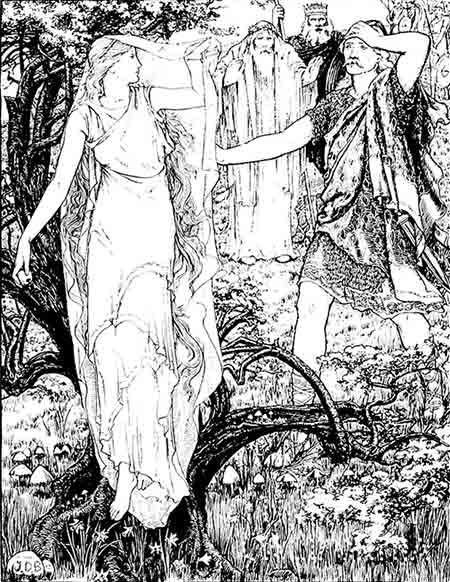
This is all for this ask but in case you have questions, you can definitely text🥰
#ask#goddess essence game#goddess game#rose maiden#áine#asteria#phoebe titaness#phoebe#greek mythology#celtic mythology#greek goddess#greek goddesses#celtic goddess#celtic goddesses#irish goddess#irish goddesses#asteroids#vedic astrology#astrology#nakshatras#astrology observations#sidereal astrology#astro notes#astrology tumblr
13 notes
·
View notes
Text



Three Faces of Hecate )O( Hecate: Triple-Bodied Greek Goddess of Witchcraft and Keeper of Keys
Hecate the goddess of Greek mythology has been primarily remembered for her associations with magic and witchcraft. Throughout history however, her sphere of influence also included the moon, night, crossroads, boundaries, ghosts and necromancy. Although Hecate was once considered to be a powerful Greek goddess of witchcraft, Hecate was not a major deity when compared, for instance, to the Twelve Olympians.
There are therefore few myths which revolve around this Greek goddess of magic. Nevertheless, the goddess Hecate plays a particularly important role in the Greek myth which relates the abduction of Persephone. It is also from this myth that the quintessential representation of Hecate, as a goddess holding a flaming torch in each hand, is derived.
The Powers of Hecate, the Greek Goddess of Witchcraft
It is generally believed that the goddess Hecate was the daughter of Perses and Asteria, both of whom were from the second generation of Titans. Nevertheless, some have claimed that she was the daughter of Zeus and either Hera or Pheraea. Yet others have stated that she was a daughter either of Leto or of Tartarus.
In any case, it is widely accepted that Hecate the goddess was not originally a member of the Greek pantheon. In fact, her cult is said to have originated in ancient Thrace, or perhaps in Caria, Anatolia. The original worshippers of Hecate believed that the goddess had power over heaven, earth, and the seas, thus making her an incredibly powerful goddess.
Hecate, whose name came from the Greek word hekatos meaning “worker from afar,” had the power not only to bestow upon those she favored wealth, good fortune, and wisdom, but also to withhold these gifts from those she perceived as unworthy. She was honored by all the gods, including Zeus. As she sided with the Olympians during the Titanomachy, she was the only member of the old regime who retained her powers following the defeat of the Titans.
Within ancient Greek religion Hecate had many different roles, as goddess not just of witchcraft, but also of magic, spells, the night, ghosts, light, necromancy, and even the moon. She was also seen as a goddess of oikos, meaning the household and family, and doorways. Some have even connected her to Artemis, who was portrayed in a similar style, with boots, torches and dogs.
Due to her extensive powers, Hecate has been confused and identified with several other deities throughout history. For instance, as a goddess of nature, she was identified with Demeter, whilst as a moon goddess, she has been identified with Persephone.
Hekate, Keeper of the Keys --Mahaboka
13 notes
·
View notes
Text
I love all my fellow Lady Asteria worshippers <3
the ones that post about her, the ones that don’t, the ones that are just beginning and the ones that are experienced, those that I haven’t met yet and those that I have, I love you all <3
#I’m having feelings rn#asteria#asteria worship#hellenic deities#lady asteria#hellenic pagan#hellenic pantheon#hellenic polytheism#hellenic polytheist#goddess of falling stars#hellenic polythiest#asteria deity#hellenic worship#hellenic polytheistic#asteria goddess#hellenic devotion#hellenic gods#hellenism#hellenic titans
20 notes
·
View notes
Text
🌌⭐️🪻🔮Lady Asteria🔮🪻⭐️🌌






#asteria offering#asteria#asteria worship#asteria worshipper#lady asteria#asteria deity#hellenic#hellenism#pagan#paganblr#stars#space#beach
52 notes
·
View notes
Text
Greek Gods & Chocolate
July 7th is apparently Chocolate Day and I'm celebrating it by sharing my thoughts on what kind of chocolates the Theoi might like as offerings because who doesn't appreciate getting chocolates?
Zeus ~ Chocolate-covered espresso beans
Hera ~ Dark chocolate-covered pomegranate seeds
Hestia ~ Chocolate cinnamon bears (or chocolate cookies)
Demeter ~ Heavenly Organics chocolate honey patties (or chocolate muffins)
Poseidon ~ Fudgesicle/Fudge pop
Hades ~ Ghirardelli Dark chocolate mint squares
Persephone ~ Lindt Dark chocolate pomegranate bar
Hekate ~ meiji Chocorooms
Aphrodite ~ GODIVA chocolates
Ares ~ Tabasco dark chocolate wedges
Athena ~ Dark chocolate-covered blueberries
Hephaestus ~ Toblerone (or lava cake)
Asteria ~ Chocolate stars
Artemis ~ S'mores granola bars
Apollo ~ Terry's chocolate orange ball
Hermes ~ Japanese KitKats
Dionysus ~ Brix bites (or special brownies)
Iris ~ Smarties (they are like M&Ms but use fruits and vegetables for dyes)
Hermaphroditus ~ Hershey's Kisses
(These are not official / historically accurate offerings. This is my UPG and I wanted to share this idea with other devotees so more love can be shown to the Theoi)
#hellenic polytheist#witch#devotee#worshipper#offerings#chocolate#zeus#hera#hestia#demeter#poseidon#hades#persephone#hekate#aphrodite#ares#athena#hephaestus#asteria#artemis#apollo#hermes#dionysus#iris#hermaphroditus
668 notes
·
View notes
Text



Hekate - Triple Goddess )O( Talon Abraxas
Hecate: Triple-Bodied Greek Goddess of Witchcraft and Keeper of Keys
Hecate the goddess of Greek mythology has been primarily remembered for her associations with magic and witchcraft. Throughout history however, her sphere of influence also included the moon, night, crossroads, boundaries, ghosts and necromancy. Although Hecate was once considered to be a powerful Greek goddess of witchcraft, Hecate was not a major deity when compared, for instance, to the Twelve Olympians.
There are therefore few myths which revolve around this Greek goddess of magic. Nevertheless, the goddess Hecate plays a particularly important role in the Greek myth which relates the abduction of Persephone. It is also from this myth that the quintessential representation of Hecate, as a goddess holding a flaming torch in each hand, is derived.
The Powers of Hecate, the Greek Goddess of Witchcraft
It is generally believed that the goddess Hecate was the daughter of Perses and Asteria, both of whom were from the second generation of Titans. Nevertheless, some have claimed that she was the daughter of Zeus and either Hera or Pheraea. Yet others have stated that she was a daughter either of Leto or of Tartarus.
In any case, it is widely accepted that Hecate the goddess was not originally a member of the Greek pantheon. In fact, her cult is said to have originated in ancient Thrace, or perhaps in Caria, Anatolia. The original worshippers of Hecate believed that the goddess had power over heaven, earth, and the seas, thus making her an incredibly powerful goddess.
Hecate, whose name came from the Greek word hekatos meaning “worker from afar,” had the power not only to bestow upon those she favored wealth, good fortune, and wisdom, but also to withhold these gifts from those she perceived as unworthy. She was honored by all the gods, including Zeus. As she sided with the Olympians during the Titanomachy, she was the only member of the old regime who retained her powers following the defeat of the Titans.
Within ancient Greek religion Hecate had many different roles, as goddess not just of witchcraft, but also of magic, spells, the night, ghosts, light, necromancy, and even the moon. She was also seen as a goddess of oikos, meaning the household and family, and doorways. Some have even connected her to Artemis, who was portrayed in a similar style, with boots, torches and dogs.
Due to her extensive powers, Hecate has been confused and identified with several other deities throughout history. For instance, as a goddess of nature, she was identified with Demeter, whilst as a moon goddess, she has been identified with Persephone.
24 notes
·
View notes
Text
Tales of Asteria: New Year 2023 (English)

Hey, so this is pretty rushed, but I really wanted to get this out for the New Years! I don’t normally dabble in Asteria because I don’t play it, and it’s harder to get into since it was never localized, and translations of the story are pretty sparse.
However. Sync is in this. Sync is one of my favorite characters and it’s rare that I see him get events, so I had to jump on it! There aren’t any references to Asteria’s story, so the best way to look at this is ‘what if Zelos, Sync, Yuna, and Orie (Asteria OC) spent the New Year together in a contextless void,’ lol.
As always, this is machine translated, so errors are to be expected. If you see anything that you think could be translated better, my inbox is open. That said, Happy New Year, everyone!
[ Outside, at a shrine ]
Zelos: Happy New Year, everyone~! You all look great in your new clothes, they all suit you! あけましてあつめてと~!みんなの晴れ著、とっても似合ってるせ!
Orie: Happy New Year! You look great, too, Zelos. あけましておのでとうございます!ゼロスさんもよくお似合いです
Kisara: Happy New Year. I feel like these fancy clothes are forcing me to keep an awfully stiff posture. あけましておめでとう。晴れ着を纏ってこのような場に来ると何やら背筋が伸びる思いたな
Zelos: Kisara, you look absolutely stunning…and you’re so right. I feel like I’m also getting stiff all over. キサラさまもこりやまたお綺麗で…本当にその通り。背筋伸びまくっちゃって困るせ
Yuna: Not just your back, but isn’t your nose getting stiff, too? 背筋だけやのうて鼻の下も伸びまくってるんてちゃうの?
Sync: It’s barely the start of the new year and you’re already acting like a dog. You’re still a black hole of worldly desires. 元旦から節操なきすき。相変わらず煩悩の塊だね
Yuna: Even the New Year’s bell will be depressed by your powerlessness. 除夜の鐘も自分の無力さに落ち込んでまうわ
Zelos: I understand Sync, but Yuna, why are you treating me so badly when we haven’t seen each other in ages? シンクはわかるけどよ、ユナさぁん、久しぶりだってのに俺さまの扱いひどくない?
Yuna: I don’t know what you’re talking about. It’s been so long, but do you think I forgot you? そんな事あらへんよ。長い事会うてなかったから忘れてもうたんとちゃう?
Orie: It’s been so long, Yuna. I’m glad you made it here in time! 本当にお久しぶりですね、ユナさん。到着が間に合ってよかったです!
Kisara: I heard you’ve been traveling the world and doing research. 世界中を取材して回っていたそうだな
Yuna: That’s right. But, I wanted to spend the New Year with everyone, so I’m glad I made it. そやねん。けど、みんなとお正月したかったから嬉しいわ
Sync: It’s finally our turn to pay our respects. I can’t stand these long lines. やっと順番がまわってきた。��でるだけでも大行列やってらんないね
Zelos: Oh, finally! Well, uh, there were some rules, weren't there? Do I just put my hands together like normal? お、いよいよか!、えーと、何か決まりあったよな。普通に手を合わせればいいんだっけ?
Yuna: No. You have to put your hands together, turn to the right, then turn to the left, repeat three times, and then bark like a dog. そ。手を合わせてくるっと右回り、そんで次はくるっと左回り、三回繰り返して「ワン」とくんや
Yuna: That’s a lie. ウソやけど
Orie: Yuna, you’re lying again! もう、ユナさんったら!また嘘をついて!
Kisara: It’s two bows, two claps, and then one more bow. Are we supposed to say something at the end? ニ礼、二拍手、一礼だったか。最後に何言う必要はあるのか?
Orie: Yes. You can say what your hopes and wishes are for the new year. そうですね。今年の抱負や願い事などを言ってもいいかもしれませんね
Sync: It must be hard for god to hear so many wishes at once. こんなに大勢の願い事一度に聞かされる神サマも大変だね
Zelos: What are you talking about!? Stop being so stubborn and ask for whatever you want, c’mon, c’mon. 何ひねた事言ってんの!意地張らずにあんな事やこんな事お願いしちゃえよ、ほらほら
Sync: Hey, don’t push me. ちょ、背中を押すな
Orie: I hope everyone will be happy and healthy this year… 今年もみんな健康でー緒に楽しくすごせますように…
Kisara: May we continue to have the strength to protect our loved ones. 変わらず大切な人達を守り抜けますように
Yuna: Aspirations and wishes, huh… I have a lot of those, but right now— 抱負や願い事かぁ…いろいろあるんやけどひとまず——
Yuna: I wish for a very interesting New Year’s Eve ♪ めっちゃ面白いお正月になりますように ♪
[ Grrrrrrrr… ] [ ゴゴゴゴゴ… ]
Zelos: Hm? What’s that noise? ん?何の音?
Sync: This presence… There’s something here in the shrine! この気配…境内に何かがいる!
[ Graoooooo! ] [ ギャオオオオン! ]
Kisara: What kind of monster is that…!? It’s white, round , just like— 何だあの魔物��…!?白くて丸くて、まるで——
Orie: It looks like…a giant kagami mochi…! まるで、巨大な鏡餅…みたいですね…!
Yuna: Oh no! The worshippers are in an uproar! あかん!参拝客が大騒ぎや!
Zelos: If it looks like mochi, I’ll grill it like mochi! Fireball! 餅なら餅らしく大人しく焼かれる!ファイアボール!
[ Hiss… ] [ シーン… ]
Zelos: Eh, you’re joking? Isn’t this the moment when I look cool? え、嘘でしょ?ここはカッコよく決まるとこじゃねーの?
Sync: What are you playing at? Thunderblade! 何遊んでるわけ?サンダーブレード!
[ Hiss… ] [ シーン… ]
Orie: It seems like something is sealing our power. Everyone, take these! どうやら何らかの力によって力を封じられているようですみなさん、これを!
Yuna: What’s all this? A hagoita, a kite, a kendama, and a spinning top…? 何やのこれ。羽子板に、凧に、けん玉に、独楽…?
Zelos: You’re kidding me. Can we really fight with these? 冗談キツいぜ。これで戦えっての?
Kisara: I don’t see any other option. I’ll use the hagoita. —Haa! 他に選択肢はないだろう。私はこの板を使わせてもらう。——はぁっ!
Orie: That’s amazing, Kisara! You’re using the hagoita as a shield…! すごいですキサラさん!まるで盾のように羽子板を…!
Sync: There’s no other choice. I’ll use this. Kisara, cover me! 仕方ないな。ボクはこれを使う。キサラ、援護を!
Kisara: Leave it to me. Now, Sync! 任せる。今だ、シンク!
Sync: Ha! はっ!
Yuna: He used a kite string to tie up the mochi monster. He's so clever. 凧糸を使って餅オバケを縛りあげてはるわ。やるやないの
Yuna: Well, Orie, shall we spin the tops together? Now, let’s do it… ほなウチとオリエは、独楽回してもしここか?ほら、いうして…
Orie: It’s a little tricky. Well… here we go! けっこうコツがいりますね。よいしょっと…えい!
[ Graaaa! ] [ ギャアア! ]
Yuna: You’re pretty good for your first time. 初めてにしては、なかなか上手やないの
Orie: Ehehe ♪ えへへ ♪
Zelos: Are those tops really that powerful!? No way… Oh well, I guess I’ll use this… 独楽ってこんな殺傷能力高いの!?ウソだろ…仕方ねぇな、じゃあ俺はこれで…
Zelos: One, two, three…shit! This is surprisingly hard! よっ、ほっ、はっ…くそ!意外と難しいな!
Sync: Excuse you, what are you playing with the kendama for? ちょっと、何けん玉で遊んでるのさ
Zelos: No, I’m not playing with it—whoa! This is addicting! いや別に遊んでるわけじゃべーって。っしゃー!、はまったぁ!
Orie: You’re doing great, Zelos! …Huh? The kendama looks a little strange… すごいです、ゼロスさん!…あれ?何だかけん玉の様子が…
Kisara: It’s going to explore! Hurry, throw it at the monster! 爆発するぞ!魔物に向かって投げる!
Zelos: Oi, oi, oi, oi, seriously!? Then, eat this! おいおいおいおい、マジかよ!?これでも食らえっ!
[ Graaaaaaaaaaaaaa…! ] [ ギャフアアアアアアアアア…! ]
Yuna: All right. たーまやー
Orie: That explosion was so powerful. A kendama-shaped bomb… How dangerous… すごい威力です。けん玉型の爆弾だったんですね…。何て危険な…
Zelos: No, no, no, you made that didn’t you, Orie? いやいやいや、これ準備したのオリエちゃんでしょ?
Yuna: Hey, what’s going on with the mochi ghost? なぁ、餅オバケの様子何やおかしない?
Kisara: What the? It’s shaking and starting to swell…! Get down! 何だ?ぷるぷる震えて膨らんで…!!伏せろ!
[ BOOOOOM! ] [ バーーーン!]
Zelos: Uwaah!! うわーっ!!
Orie: Zelos! Are you okay, Zelos!? ゼロスさん!大丈夫ですか、ゼロスさん!
Yuna: How awful…! He’s trapped under the chunks of exploded mochi… うわ酷い…!爆発四散した餅にとりこまれてもうたわ…
Kisara: Hold on, I’ll help you! It’s so sticky that I can’t get it all off…! 待っていろ、今助ける!くっべたべたして取れないな…!
Sync: Why don’t we just leave it be for now? しばらくそのままにしておけば?
Zelos: Damn it! Why did this happen to me! Help me~!! くそー!何で俺さまだけ!助けてくれ~!!
[ Scene change to indoors ]
Zelos: Uwaah!! うわ~っ!!
Sync: You’re noisy. If you’re awake, get on with it and start helping. うるさいな。目が覚めたんなら、さっさと手伝ってよ
Zelos: Eh… But the mochi..? Where’s the mochi monster…? え…?餅は…?巨大な餅が爆発して…
Sync: Are you still sleeping? 何寝ぼけてるのさ
Orie: Zelos, you’re awake! Well, I was right about what I said. You drank too much! ゼロスさん、起きたんですね!もー、たから言ったじゃないですか。飲みすぎですよって!
Kisara: Even if the first sunrise fills you up, you have to take things in stride. 初日の出が肴とはいえ、程度はわきまえないとな
Zelos: So, I woke up to see the sunrise… and then fell back asleep and had a bad dream. There was a monster made out of mochi at the shrine. そっか、俺、日の出見て二度寝して…新年早々嫌な夢見たぜ。初詣に行ったら餅の魔物がいてな
Sync: Sounds like a dream come true. 正夢だったりしてね
Zelos: No, it wasn’t. There’s one big different between my dream and reality. You see, there’s no Yuna here— ないない。夢の中とは大きな違いがあんのよ。ここにユナちゃんがいて——
Yuna: Happy New Year. Sorry, I’m late. あけましておめでとさん。遅なってごめんな
Orie: Yuna! I’m so glad you arrived in time! ユナさん!到着が間に合ってよかったです!
Kisara: I heard you’ve been traveling the world and doing research. 世界中を取材して回っていたそうだな
Yuna: That’s right. But, I wanted to spend the New Year with everyone, so I’m glad I made it. そやねん。けど、みんなとお正月したかったから嬉しいわ
Sync: …So, what did you say about Yuna? …で、ュナが何だって
Zelos: Hehe… w-well, I… へへ…ま、まさかね…
Kisara: I’ve finished the the ozoni and the rest of the osechi. ちょうとおせちとお雑煮が出来たところだ
Orie: Let’s start the New Year’s party ♪ Happy New Year, everyone! 新年会を始めましょう ♪ 改めましてみなさん、あけましておめでとうございます!
Everyone: Happy New Year! あけましておめでとうございます
Yuna: Wow~ This is all so fancy! Did you guys make this? や~、随分豪勢やないの!これ、オリエ達が作ったん?
Orie: Yes! Kisara and I put our all into it! はい!キサラさんと腕によリをかけて作りました!
Zelos: Delicious osechi, delicious sake, and all the honeys in their best clothes... things are going to be good this year. 美味いおせち、美味い酒、それに晴れ若姿のハニー達…今年はいい事ありそうたぜ
Yuna: I know, right? After we finish eating osechi and ozoni, why don't we all go to the shrine? せやなあ。おせちとお雑煮食べ終わったら、みんなで初詣も行かへん?
Kisara: Yes. We should go. I was just talking about that with Orie. ああ。行こう。さきほど、オリエともそう話していたところだ
Zelos: J-J-Just one moment? Yuna, can I ask you for one little favor? ちょちょ、ちょっとユナちゃん?一つだけ俺さまのお願い聞いてくんない?
Yuna: What, why do you look so pale? 何やの、顔真っ青にして?
Zelos: I just think peace is something precious and irreplaceable! やっぱりさ、平和って何事にも代え��れない尊いものだと思うわけよ!
Zelos: So, when you go to the shrine? Please tell god, “I wish for a very peaceful new year.” だから初詣で神様にはこう言って?「めっちゃ平和なお正月になりますように」…てね!
#Tales of Asteria#sync the tempest#zelos wilder#kisara#orie#tota#tos#toa#i didn't include images bc asteria only has one character per screen most of the time#and the characters all have static expressions so#nix translates#how did they get sync to celebrate with them??? we will never know
6 notes
·
View notes